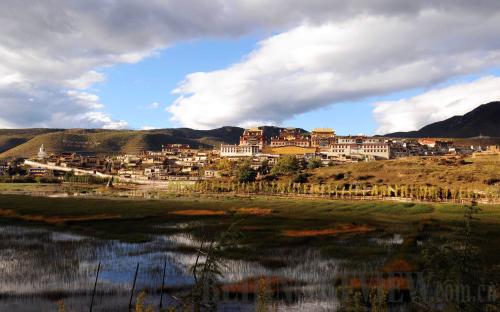|
 |
|
LAND OF INNER PEACE: View of Gedan Songzanlin, 5 km from the seat of Shangri-La County, is the largest Tibetan Buddhist monastery in Yunnan Province (XINHUA) |
Surrounding the vast Himalayan Mountain ranges are countless places that claim to be "the real Shangri-La." Lots of them are in China, and in 2001, Zhongdian County in southwestern Yunnan Province officially renamed itself Shangri-La County. But did Zhongdian deserve this honor more than the other pretenders?
James Hilton, author of Lost Horizon, was the man who started the "Shangri-La" phenomena. His main character, Hugh Conway, was a British war veteran who found inner peace, love and a sense of purpose in this Himalayan utopia. The book was set in "Shangri-La," a mere figment of the author's imagination.
The common consensus amongst those interested is that Hilton's inspiration for his novel came from the writing of Joseph Rock, an Austrian-American botanist who spent 27 years in southwest China. From 1922 to 1949 he spent most of his time studying the flora, peoples and languages of the region. During his time in Yunnan Province, he was based in Yuhu Village, which is situated approximately 20 km away from Lijiang, at the foot of the Snow Mountain—officially the southern-most peak of the Himalayas.
Rock wrote for National Geographic magazine about his experiences and observations. What he described is what Hilton writes about in Lost Horizon. Hilton had never been to the region and had only Rock's illustration of it to go on.
Another author, Peter Goullart, who at that point was more of an explorer, fled with Rock to Kunming, capital of Yunnan. He had been in the region at the same time and eventually wrote Forgotten Kingdom—a book about local Naxi culture.
Today, all that remains of Rock's Yuhu legacy is a small and well maintained museum dedicated to his time in the village. Taking photos was forbidden when I visited. The museum has copies of various editions of National Geographic magazine that he contributed to. It also contains many of the tools that he brought with him from America, or procured while he was in Yuhu. His bedroom has been left undisturbed, arranged simply and neatly.
Walking around Yuhu Village, it's easy to see why Rock decided to stay there so long. As intimidating as it is majestic, the Snow Mountain overlooks the village, like a 6,000-meter-tall guard dog with jagged teeth protecting it's people from outside invaders. On the ground, the meandering streets wind in tandem with the streams as wild horses trot along nonchalantly. Like most villages, the population is made up by mainly the elderly and very young. Most adults are in bigger cities trying to earn money to bring home. The village elders are happy to retire in such a beautiful place and the children seem more than content to stay there, at least until they grow up.
As a result of gold-mining, the village is more wealthy than lots of its regional peers. Some of the mining is legal and some of it illegal. There are large gold reserves in the area and the government to date has only made half-hearted efforts to police the situation. As long as a large enough cut of the profit falls into the right hands, locals tell me they don't expect much to change on that front. Everybody wins.
"Is that why you are all so happy in this village, then?" I asked one elderly local.
"No…it's because we live—in Shangri-La…" She replied.
She kept a straight face for a few moments, before her face lit up and she let out a hearty chuckle.
I don't know what she was laughing about—after all—she was right.
The author is a Briton living in China
Expats, we need your stories!
If you're an expatriate living or once lived in China and have a story to tell or an opinion to share about any aspect of life here, we are interested in hearing about it. We offer payment for published stories (700-900 words). Submissions may be edited.
Email us at: zanjifang@bjreview.com
Please provide your name, nationality and address along with your stories | 